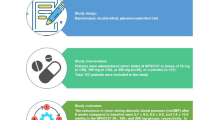Summary
To evaluate the magnitude and duration of the antihypertensive effect of sustained release (SRO) isradipine, 37 uncomplicated essential hypertensive patients (diastolic blood pressure 100–115 mm Hg after a one month run-in on placebo) were randomised to receive, according to a double-blind cross-over design, isradipine SRO 5 mg once daily and the corresponding placebo for 1 month. At the end of each treatment period, sitting blood pressure and heart rate were measured immediately before and every hour for 6 h after the last dose. Thirty-four patients [16 m, age 54 (7) y] completed the study.
As compared to randomised placebo, isradipine SRO significantly reduced the systolic (SBP) and diastolic (DBP) blood pressure. Absolute DBP decrements versus placebo peaked 6 h after dosing (-8.8 mm Hg) and were not significantly lower (-8.2 mm Hg) at the end of the dose interval. At the same times, the absolute decrements in SBP were -9.8 mm Hg and -9.7 mm Hg, respectively.
DBP was normalised in 19 patients (56%) at peak and in 17 (50%) at trough time. The trough to peak efficacy ratio in patients with peak DBP ≤ 90 mm Hg was 70%. Heart rate was slightly increased by isradipine SRO. Adverse effects monitored with a check-list occurred in 8/36 patients (22%) on isradipine SRO and in 4/35 (11%) on randomized placebo.
The data suggest that isradipine SRO is an effective antihypertensive drug, with a trough to peak efficacy ratio supporting once daily administration in most mild to moderate essential hypertensives.
Similar content being viewed by others
References
Fitton A, Benfield P (1990) Isradipine. A review of its pharmacodynamic and pharmacokinetic properties, and therapeutic use in cardiovascular disease. Drugs 40: 31–74
Shepherd AMM, Carr AA, Davidov M, Hamilton J, Schnaper H, Velasquez M, Brockway B, Prisant M, Hamilton B, Gonasun L (1989) Efficacy and safety of isradipine in hypertension. J Cardiovasc Pharmacol 13: 580–585
The Italian-Belgian Isradipine Study Group (1989) Multicenter evaluation of the safety and efficacy of isradipine in hypertension. Am J Med 86 [Suppl 4A]: 94–97
Staessen J, Lijnen P, Fagard R, Hespel P, Tan WP, Devos P, Amery A (1989) Effects of the new calcium entry blocker isradipine (PN 200-110) in essential hypertension. J Cardiovasc Pharmacol 13: 271–276
Rose M, McMahon FG (1990) Some problems with antihypertensive drug studies in the context of the new guidelines. Am J Hypertens 3: 151–155
Lacourciere Y, Poirrier L, Dion D, Provencher P (1990) Antihypertensive effect of isradipine administered once or twice daily or ambulatory blood pressure. Am J Cardiol 65: 467–472
Diemont WL, Stegeman CJ, Beekman J, Siegers AMJ, Hagels G, de Bruijn HB (1991) Low dose isradipine once daily effectively controls 24-h blood pressure in essential hypertension. Am J Hypertens 4: 163S-167S
Andersson OK, Persson B, Hedner T, Aurell M, Wysocki M (1989) Blood pressure control and haemodynamic adaptation with the dihydropyridine calcium antagonist isradipine: a controlled study in middle-aged hypertensive men. J Hypertension 7: 465–469
Kiowski W, Erne P, Bertel O, Bolli P, Buehler F (1986) Acute and chronic sympathetic reflex activation and antihypertensive response to nifedipine. J Am Coll Cardiol 7: 344–348
Dahlof B (1989) Hemodynamic response, safety, and efficacy of isradipine in the treatment of essential hypertension. Am J Med 86 [Suppl 4A]: 19–26
Luescher TF, Waeber B (1991) Calcium antagonists as first-line therapy in hypertension: results of the Swiss Isradipine Study. J Cardiovasc Pharmacol 18 [Suppl 3]: S1-S3
Author information
Authors and Affiliations
Rights and permissions
About this article
Cite this article
Arzilli, F., Gandolfi, E., Del Prato, C. et al. Antihypertensive effect of once daily sustained release isradipine: a placebo controlled cross-over study. Eur J Clin Pharmacol 44, 23–25 (1993). https://doi.org/10.1007/BF00315275
Received:
Accepted:
Issue Date:
DOI: https://doi.org/10.1007/BF00315275




